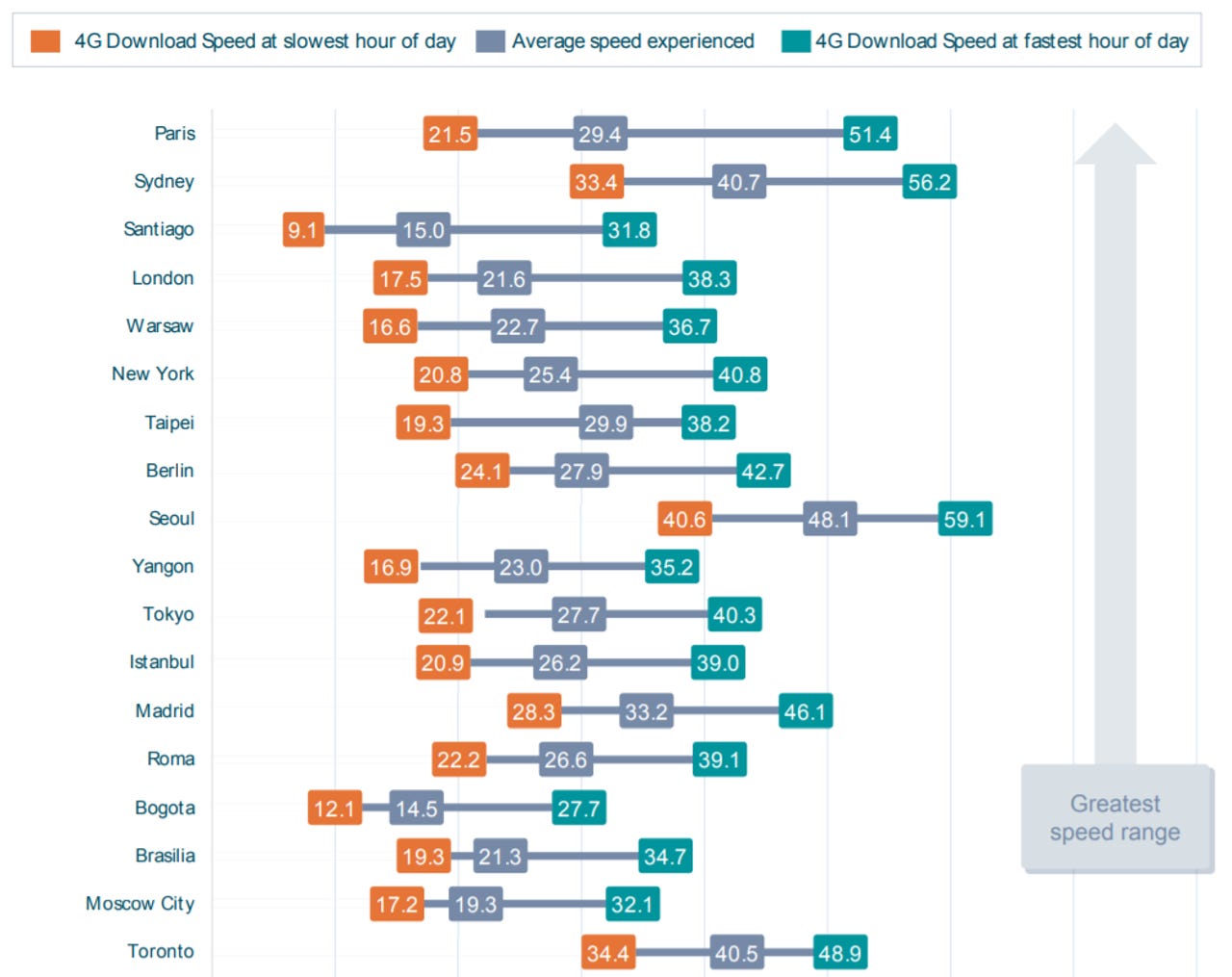5G needed to ease 4G LTE congestion: OpenSignal


Download speeds across 4G LTE mobile networks "vary tremendously" during the day due to increasing congestion, a new report from OpenSignal has said, with 5G networks primed to ease this traffic.
"Across 77 countries studied, 4G download speeds are between 31.2 Mbps and 5.8 Mbps faster at the best hour of day compared with the slowest hour of the day," the mobile analytics company's report said.
"5G will add new capacities to help with these wide time-of-day speed variations ... 5G won't just deliver faster speeds; 5G will provide a blanket of capacity, built using new high-bandwidth, high-frequency spectrum bands that will help mitigate the daily cycle of congestion we see on today's 4G networks. These 5G services will support more simultaneous users at very fast speeds.
"Even the fastest 4G countries need 5G to counter big drops in speeds at busy times."
According to the report, during the fastest hour of the day, Australia ranked seventh globally with 4G speeds of 50.3Mbps.
Ahead of Australia were South Korea and Switzerland, with both around the 55Mbps mark; the Netherlands and Singapore at around 54Mbps; and Norway and Denmark, at 53Mbps. New Zealand sat in ninth place, at fastest hour speeds of 45Mbps; and Canada in 10th, at 43Mbps.
Trailing these countries was the UK in 30th place, with close to 35Mbps speeds during the fastest hour of the day; and the United States in 47th, with speeds of almost 29Mbps.
In comparison of fastest hour speeds, Australia ranked fifth on average 4G speeds with just over 38Mbps. South Korea, Singapore, Norway, and the Netherlands scored 47Mbps, 45Mbps, 44Mbps, and 43Mbps, respectively, to round out the top five.
Canada was just under 38Mbps; Denmark at 37Mbps; New Zealand and Switzerland around 36Mbps; the UK at 22.5Mbps; and the US at 18Mbps.
"The US will be an interesting bellwether of 5G's impact on congestion and speed consistency because it sits smack dab in the middle rank of countries for average 4G download speeds and in its range of speed variation by time of day," OpenSignal said.
"Any improvements we see in the US mobile consumer experience due to 5G, we'll likely see reflected in many other parts of the world."
The times at which 4G download speeds are slowest also vary between countries, with the Netherlands reported as seeing its slowest speeds at 4pm; the UK at 5pm; Singapore and Norway at 6pm; Switzerland and the US at 8pm; Australia, New Zealand, and Denmark at 9pm; Canada at 10pm; and South Korea at 11pm.
Cities will benefit the most from 5G, according to OpenSignal, because this is where users see the most widely varying speeds throughout the day. For instance, Sydney sees fastest hour speeds of 56Mbps, average speeds of around 41Mbps, and slowest hour speeds of 33Mbps.
Similarly, Seoul has fastest hour speeds of 59Mbps, average speeds of 48Mbps, and slowest hour speeds of just under 41Mbps.
"Cities often have the latest 4G technologies deployed, and so should deliver the fastest speeds. And our measurements show they do, but only in the late hours night, when most users aren't seeking a fast mobile experience. During the day and evening, speeds drop dramatically, highlighting the failure of current 4G networks to deliver a consistent experience," OpenSignal said.
"Many of the new 5G-only spectrum bands are ideally suited to cities -- such as mmWave -- because of their short range and extremely high capacities.
"The new 5G bands will open up hundreds of megahertz of new extremely high-frequency spectrum for mobile broadband use, delivering much greater capacity to minimise the effect of congestion."
Related Coverage
Galaxy S10: Samsung's lineup is solid, but maybe wait for Galaxy S10 5G
Samsung unveiled its Galaxy S10 line, but gave us two other devices that'll require a bit of a wait. Also is DeX a thin client replacement? ZDNet's Larry Dignan sits down with TechRepublic's Bill Detwiler and Karen Roby to discuss the latest revealings.
Ericsson, Juniper announce updates to joint 5G transport offerings
The two companies have already signed more than 20 new customers since announcing their joint effort in September.
Ericsson boosts 5G platform, signs 5G deal with Oppo
Ericsson and Oppo will collaborate on 5G device testing and demonstrations, as well as 2G, 3G, and 4G patent cross-licensing, while Ericsson has also made updates and improvements across its 5G platform for carriers.
Cisco expects just 422 million 5G connections by 2022
In its latest mobile data report, Cisco predicts that only about 3 percent of total mobile connections will occur over upgraded high-speed networks by 2022.
5G, smart cities, and other top tech trends for 2019 (TechRepublic)
Quantitative futurist Amy Webb shares her predictions for 2019 tech trends.
Private LTE & 5G networks to surpass $5B annually by 2021 (TechRepublic)
Equipment vendors are pitching turn-key "network in a box" technology to governments and enterprises eager to deploy wide area networks in localities without existing adequate infrastructure.